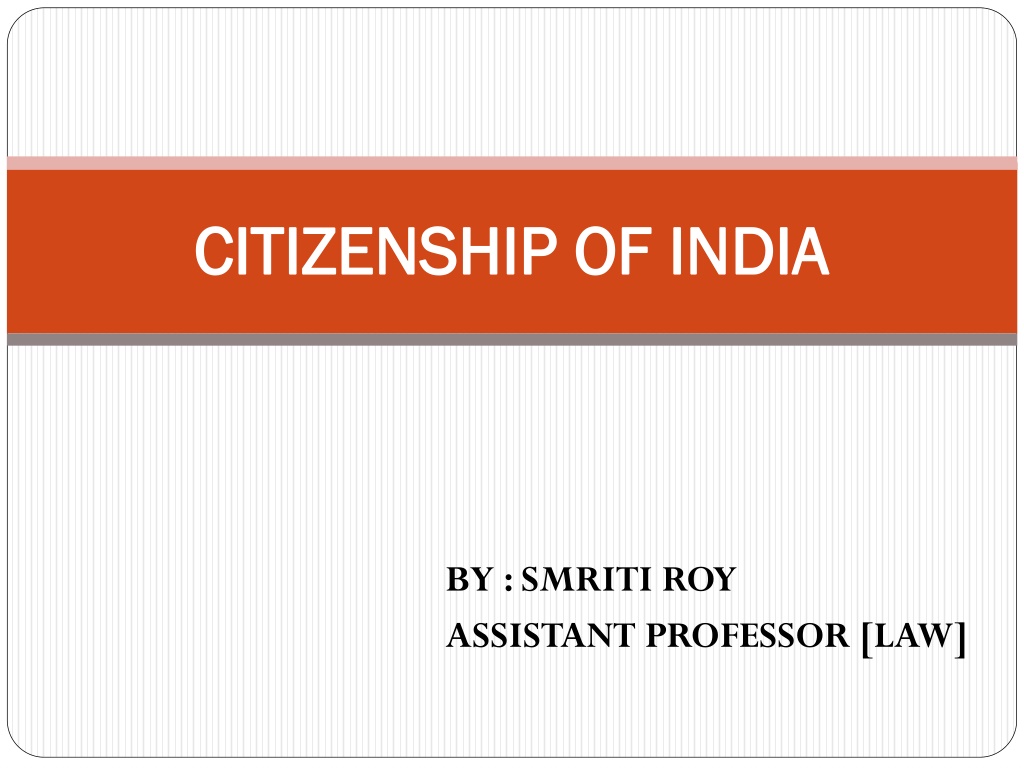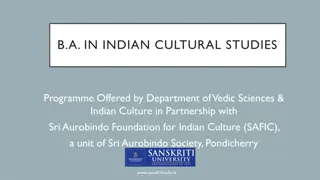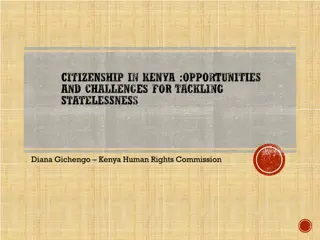Understanding Indian Citizenship Law
Indian citizenship is defined by the relationship between individuals and the state, with principles such as jus soli and jus sanguinis determining eligibility. The Indian Citizenship Act of 1955 outlines the rights and procedures for acquiring citizenship, including provisions for migrants from Pakistan. This comprehensive guide covers key articles and principles of Indian citizenship, shedding light on the legal framework and historical context.
Download Presentation

Please find below an Image/Link to download the presentation.
The content on the website is provided AS IS for your information and personal use only. It may not be sold, licensed, or shared on other websites without obtaining consent from the author. Download presentation by click this link. If you encounter any issues during the download, it is possible that the publisher has removed the file from their server.
E N D
Presentation Transcript
CITIZENSHIP OF INDIA CITIZENSHIP OF INDIA BY :SMRITI ROY ASSISTANT PROFESSOR [LAW]
What is Citizenship? What is Citizenship? Citizenship signifies the relationship between individual and state. Citizenship is an idea of exclusion as it excludes non-citizens. Citizens are full members of the Indian State and owe allegiance to it. They enjoy all civil and political rights.
Principles of citizenship Principles of citizenship There are two well-known principles for the grant of citizenship: jus soli confers citizenship on the basis of place of birth, jus sanguinis gives recognition to blood ties / blood relations.
INDIAN CITIZENSHIP After the commencement of constitution CITIZENSHIP ACT, 1955 On commencement of the constitution. PART II(ART. 5-11)
Article 5 Article 5 Citizenship Constitution It provided for citizenship on commencement of the Constitution. All those domiciled and born in India were given citizenship. Even those who were domiciled but not born in India, but either of whose parent was born in India, were considered citizens. Anyone who had been an ordinary resident for more than five years,too,was entitled to apply for citizenship. at the commencement of the
Article 6 Article 6 Rights of citizenship of certain persons who have migrated to India from Pakistan:- It provided rights of citizenship of certain persons who have migrated to India from Pakistan. Since Independence was preceded by Partition and migration, Article 6 laid down that anyone who migrated to India before July 19, 1949, would automatically become an Indian citizen if he or either of his parents or grandparents was born in India. But those who entered India after this date needed to register themselves
Article 7 Article 7 Rights of citizenship of certain migrants to Pakistan It Provides the Rights of citizenship of certain migrants to Pakistan. Those who had migrated to Pakistan after March 1, 1947 but subsequently returned on resettlement permits were included within the citizenship net. The law was more sympathetic to those who migrated from Pakistan and called them refugees than to those who, in a state of confusion, were stranded in Pakistan or went there but decided to return soon.
Article 8 Article 8 It Provided Rights of citizenship of certain persons of Indian origin residing outside India. Any Person of Indian Origin residing outside India who, or either of whose parents or grandparents, was born in India could register himself or herself as an Indian citizen with Indian Diplomatic Mission
Article 9 Provided that if any person voluntarily acquired the citizenship of a foreign State will no longer be a citizen of India. Article10 It says that every person who is or is deemed to be a citizen of India under any of the foregoing provisions of this Part shall, subject to the provisions of any law that may be made by Parliament,continue to be such citizen.
Article 11 It empowers Parliament to make any provision with respect to the acquisition and termination of citizenship and all matters relating to it.
Rights and privileges available to Rights and privileges available to citizen of India citizen of India F.R No discrimination on the basis of religion race caste sex place of birth [article 15] Right to Equality and opportunity in matters of public employment [article 16].Right to freedom enumerated in [Article 19]. Cultural and educational rights [article 29 and 30] CONSTITUTIONAL POSTS Certain offices under the constitution can be occupied by citizens only like, President [article 58 (1) (a)] vice president [Article 66 (3) (a)] judges of supreme court and high court [article 124 (3), 217 (2)]; Attorney General of India article [76 (1)]; governor of state [article 157]; Advocate general of state [article 165] etc. Right to vote for election of Parliament and state legislature. Only citizens can become members of parliament and state legislature.
Citizenship Act, 1955 and Citizenship Act, 1955 and Amendments Amendments ACQUISITION OF CITIZENSHIP UNDER THE CITIZENSHIP ACT. 1955 INCORPORATION OF TERRITORY SEC. 7 NATURALIZATI ON SEC. 6 BIRTH SEC.3 DESCENT SEC.4 REGESTRATION SEC.5
By Birth: Sec 3 of Citizenship Act By Birth: Sec 3 of Citizenship Act A person born in India:- Every person born in India on or after 26.01.1950 but before 01.07.1987 is an Indian citizen irrespective of the nationality of his/her parents. Every person born in India between 01.07.1987 and 02.12.2003 is a citizen of India given either of his/her parents is a citizen of the country at the time of his/her birth. Every person born in India on or after 3.12.2003 is a citizen of the country given both his/her parents are Indians or at least one parent is a citizen and the other is not an illegal migrant at the time of birth.
By Descent: sec 4 of Citizenship Act By Descent: sec 4 of Citizenship Act A person born outside India on or after January 26, 1950 is a citizen of India by descent if his/her father was a citizen of India by birth. A person born outside India on or after December 10, 1992, but before December 3, 2004 if either of his/her parent was a citizen of India by birth. If a person born outside India or after December 3, 2004 has to acquire citizenship, his/her parents have to declare that the minor does not hold a passport of another country and his/her birth is registered at an Indian consulate within one year of birth.
By Registration: Sec. 5 of Citizenship By Registration: Sec. 5 of Citizenship Act Act A person of Indian origin who has been a resident of India for 7 years before applying for registration. A person of Indian origin who is a resident of any country outside undivided India. A person who is married to an Indian citizen and is ordinarily resident for 7 years before applying for registration. Minor children of persons who are citizens of India.
By Naturalization: By Naturalization: sec 6 of Citizenship sec 6 of Citizenship Act Act Any person of full age and capacity not being an illegal migrant can apply for the grant of a certificate of naturalization to him; the Central Government may, if satisfied that the applicant is qualified for naturalization: A person can acquire citizenship by naturalization if he/she is ordinarily resident of India for 12 years (throughout 12 months preceding the date of application and 11 years in the aggregate) and fulfils all qualifications in the third schedule of the CitizenshipAct. The Act does not provide for dual citizenship or dual nationality (renounce any other citizenship).
He should not be citizen of a country where Indians are prevented from taking citizenship Person of good character. Adequate knowledge of languages prescribed in the 8th schedule. If certificate is issued,he should have intent to reside in India. If in the opinion of the Central Government, the applicant is a person who has rendered distinguished service to the cause of science, philosophy, art, literature, world peace or human progress generally, it may waive all or any of the conditions specified in theThird Schedule.
Citizenship by incorporation of territory Citizenship by incorporation of territory If any territory becomes a part of India, the Central Government may, by order notified in the Official Gazette, specify the persons who shall be citizens of India by reason of their connection with that territory; and those persons shall be citizens of India as from the date to be specified in the order.
Loss of citizenship Loss of citizenship TERMINATION OF CITIZENSHIP UNDR THE CITIZENSHIP ACT, 1955 DEPRIVATION [SECTION 10] TERMINATION [SECTION 9] RENUNCIATION [SECTION 8]
Loss of Citizenship in India Loss of Citizenship in India The Citizenship Act of 1955 deals with the loss of citizenship also in addition to acquisition. Accordingly, it is carried by the following means: By renunciation: Any person who has made a declaration stating his willingness to renounce the citizenship shall cease to be the citizen of India. By termination: If a person voluntarily or knowingly becomes a citizen of any foreign country. By deprivation.
1986 amendment: 1986 amendment: Unlike the constitutional provision and the original Citizenship Act that gave citizenship on the principle of jus soli to everyone born in India, the 1986 amendment to Section 3 was less inclusive. The amendment has added the condition that those who were born in India on or after January 26, 1950 but before July 1, 1987,shall be Indian citizen. Those born after July 1, 1987 and before December 4, 2003, in addition to one s own birth in India, can get citizenship only if either of his parents was an Indian citizen at the time of birth.
2003 amendment: 2003 amendment: The amendment made the above condition more stringent, keeping in view infiltration from Bangladesh. Now the law requires that for those born on or after December 4,2004, in addition to the fact of their own birth, both parents should be Indian citizens or one parent must be Indian citizen and other should not be an illegal migrant. With these restrictive amendments, India has almost moved towards the narrow principle of jus sanguinis or blood relationship. This lays down that an illegal migrant cannot claim citizenship by naturalisation or registration even if he has been a resident of India for seven years
Citizenship (Amendment) Bill 2019 Citizenship (Amendment) Bill 2019: The amendment proposes to permit members of six communities Hindus, Sikhs, Buddhists, Jains, Parsis and Christians from Pakistan, Bangladesh and Afghanistan to continue to live in India if they entered India before December 14, 2014. It also reduces the requirement for citizenship from 11 years to just 6 years. Two notifications also exempted these migrants from the Passport Act and ForeignersAct. A large number of organizations in Assam protested against this Bill as it may grant citizenship to Bangladeshi Hindu illegal migrants. The justification given for the bill is that Hindus and Buddhists are minorities in Bangladesh, and fled to India to avoid religious persecution, but Muslims are a majority in Bangladesh and so the same cannot be said about them.

 undefined
undefined


























